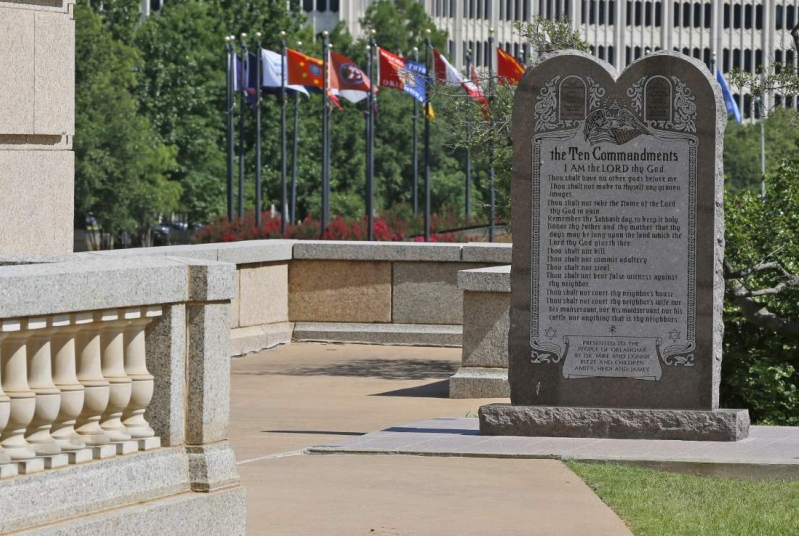
Prominent evangelist Franklin Graham has warned that the United States government is both "blatantly defying God's laws" and trying to "remove them completely from public view" after the Oklahoma Supreme Court ordered the removal of a Ten Commandments monument from the state's capitol earlier this week.
Graham, who is the president of both Samaritan's Purse and the Billy Graham Evangelistic Association, took to Facebook on Friday to weigh in on the court's decision: "When I went to school, the Ten Commandments were posted in the classroom, and the teacher led us in the Lord's Prayer before we went to lunch. There was respect throughout society for the Word of God. How times have changed! Today, everything related to God and His Word is coming under fire in our nation. On Tuesday the #Oklahoma Supreme Court ruled that a 6-foot-tall Ten Commandments monument on the capitol grounds must be removed. Governor Mary Fallin supported the monument and is looking at other legal options to keep it there-I hope she finds some."
He continued, "We're living in a time when our country is not only blatantly defying God's laws, but is trying to remove them completely from public view. Just think what a difference it would make if our school children today learned about the #TenCommandments and the God who wrote them."
As earlier reported by the Gospel Herald, the 6-foot-tall stone monument, paid for with private money and supported by lawmakers in Oklahoma, was installed in 2012.
Over the years, the presence of the structure prompted complaints that it violated the U.S. Constitution's provisions against government establishment of religion, as well as local laws.
Thus, on Tuesday, the court ruled that the placement of the monument violated a section in the state's constitution, which says no public money or property can be used either directly or indirectly for the "benefit, or support of any sect, church, denomination, or system of religion."
In announcing its decision, the court stated, "As concerns the 'historic purpose' justification, the Ten Commandments are obviously religious in nature and are an integral part of the Jewish and Christian faiths."
The 7-2 ruling overturns a decision by Seventh District Court Judge Thomas Prince, who last September concluded that the monument served a historical purpose and not solely the presentment of a religious message, as it sits on a plot of land that contains 51 other expressive monuments.
The AP notes that Governor Mary Fallin, a Republican who supported the monument's placement, was disappointed with the decision and will consult with the attorney general to look at legal options, her office said.
Oklahoma Attorney General Scott Pruitt condemned the decision, arguing that the monument was historical in nature and nearly identical to a Texas monument that was found constitutional by the U.S. Supreme Court.
"Quite simply, the Oklahoma Supreme Court got it wrong. The court completely ignored the profound historical impact of the Ten Commandments on the foundation of Western law. Furthermore, the court's incorrect interpretation of Article 2, Section 5 contradicts previous rulings of the court," he said.
Pruitt said his office will file a petition with the court for a rehearing in light of the broader implications of the ruling on other areas of state law.
"In the interim, enforcement of the court's order cannot occur. Finally, if Article 2, Section 5, is going to be construed in such a manner by the court, it will be necessary to repeal it," he said.
Dr. Mike Ritze, who donated the statue back in 2012, also expressed disappointment with the ruling and criticized the Oklahoma Supreme Court for deviating from earlier court precedents in arriving at their conclusion.
"I am deeply disappointed the court did not follow its own precedent or even bother to cite it," Ritz, who is now a Republican representative with the Oklahoma State Legislature, said."This 'opinion' reads more like a shot from the hip than a real opinion. When the court rules against legislative action that is in compliance with its own precedent, it should at least explain itself to the legislature and the people. What will now become of the Native American religious symbols at the Capitol?"






